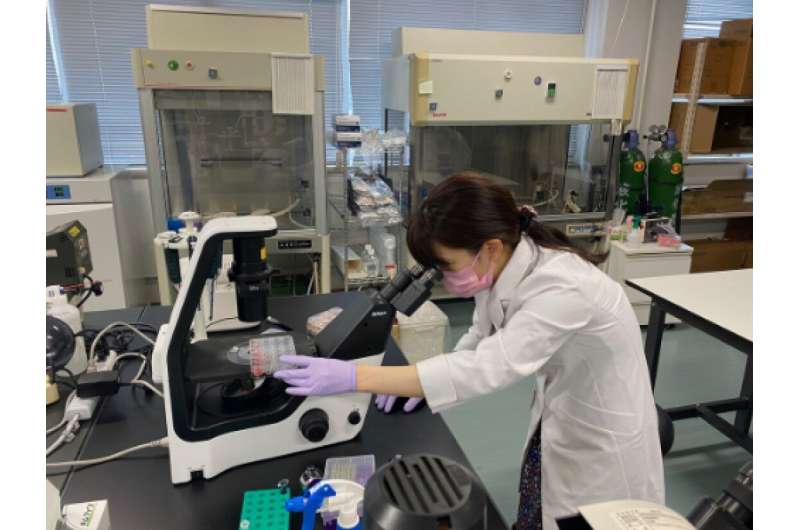Creating 'elite' antibodies at a pace that keeps up with pandemic, coronavirus variants

Japanese scientists created "elite" antibodies that defeat various coronavirus variants even at an extremely low dose through a new method that accelerated the months-long process of finding such extraordinary antibody candidates to just ten days.
Our bodies produce specific antibodies to thwart invading pathogens. Some of these antibodies are the neutralizing kind that latches onto the virus' spike protein, preventing it from hijacking and reprogramming a cell into a virus-making factory. So-called "elite" antibodies, known as broadly neutralizing antibodies, are rare immune molecules capable of keeping up with disguises used by a virus' different variants to mask its spike protein.
"Monoclonal antibodies that neutralize the SARS-CoV-2 virus are so far the most promising therapeutic intervention," Hiroshima University Professor Tomoharu Yasuda, who leads the study, said.
"Mutant viruses resistant to current vaccines are a potential but realistic risk in the near future. To prepare to fight against such viruses and to save people from those infectious diseases, we need to hurry in developing effective drugs against broad SARS-CoV-2 mutant strains."
But these life-saving molecules are laborious to locate. Researchers have to screen hundreds to hundreds of millions of B cells from patient blood samples to find the most potent candidates they can enhance and grow in laboratories as therapeutic monoclonal antibodies.
By clarifying the typical characteristics of patients likely to carry "elite" antibodies and optimizing the discovery process, Yasuda and his colleagues have dramatically cut down the number of cells needed to be screened and sped up the identification of winning antibody candidates.
Eighteen recovered patients were enrolled as blood donors for the study from April 2020 to January 2021. The patients aged 23-93 years old experienced COVID-19 at different severities. Blood samples were taken over two weeks after the patients tested positive for SARS-CoV-2—the virus that causes COVID-19—based on the germinal center reaction theory on neutralizing antibodies production.
"Getting blood samples from severe COVID-19 patients over four weeks, ideally around eight weeks, after the primary infection obtains effective elite antibodies efficiently," Yasuda explained.
After analyzing the patients' samples, they found that even though all carried neutralizing antibodies, about 40% of those had weak or no activity to beat SARS-CoV-2.
Their findings also showed that 80% of participants with severe COVID-19 made a high level of "elite" antibodies, while only 20-30% of those with mild cases did.
The new method successfully obtained five "elite" antibody candidates out of 51 cells from two donor patients. They manufactured engineered versions of these antibodies and found that four work against more dangerous strains of SARS-CoV-2 even at a low dose.
All four antibodies quelled the Alpha and Delta variants, which are more infectious than the original strain of the novel coronavirus. Two of them also neutralized the Beta variant known to reduce the effectiveness of some vaccines.
The antibodies showed IC50 potency at 3-20 ng/mL. A widely used measure of medicine effectivity, IC50 determines how much drug is needed to stop a biological process from happening by half. The researchers said that antibody treatments currently progressing in clinical trials worldwide reached IC50 potency at 15-95 ng/mL.
According to them, this technology is the first in Japan to obtain "elite" antibodies that bind to multiple threatening strains of SARS-CoV-2.
"Our approach could be useful to develop antibody drugs even in other future pandemics, not only SARS-CoV-2 mutants," Yasuda said.
Their novel technique and the four "elite" antibodies they engineered are now awaiting patent approval. The next step for the research team is to develop a technology that accelerates at a pandemic pace the manufacture of monoclonal antibody therapies effective against future SARS-CoV-2 strains. The entire manufacturing process usually takes one to three years, from discovering viable candidates to mass production for medical use.





















